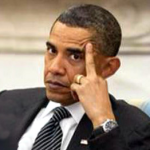Four years after President Barack Obama promised to change the culture of Washington, it’s hard to imagine how his ethics, transparency and campaign finance pledges could have backfired more thoroughly.
Even before the president solicited unlimited corporate donations for his inauguration and announced he will reinvent his campaign operation as an unrestricted lobbying group, government watchdog groups were already fed up with Obama’s many reversals.
Grievances include his failure to follow through on pledges to overhaul the public financing system, to fill vacancies at the Federal Election Commission and to make his administration the most transparent in history. Not to mention his decision to embrace unrestricted super PACs after saying he would reject them.
From a public relations point of view, Obama would have drawn far less criticism had he promised — and done — nothing on the government watchdog front. Had he not pledged “the most sweeping ethics reform in history,” critics might have made little of his administration’s many concessions to pragmatism over principle.
As it is, Obama’s stated commitment to change, coupled with his tendency to put new rules in place and then retract them, has doubly galled progressive activists and drawn a steady stream of bad press. As one ethics advocate put it: “As any parent knows, you don’t take something away that you’ve already given.”
To be fair, many watchdog groups credit Obama for important steps toward accountability and transparency. His hiring and post-employment restrictions for lobbyists seeking administration jobs were unprecedented. So were his decisions to release White House visitor logs and to require agencies to disclose many lobbyist meetings and his establishment of the ethics.data.gov website, which allows anyone to search visitor logs and campaign donors.
“The President has done more to reduce the influence of special interests in Washington than any administration in history,” White House spokesman Eric Schultz said in an email. “The President recently outlined new steps Congress should take to eliminate the corrosive influence of money in politics, like holding Congress to [the] same conflict-of-interest standards as the executive branch, and prohibiting lobbyists from bundling and bundlers from lobbying.”
Obama, moreover, has had plenty on his plate, including an economic crisis, the health care overhaul, recurring budget battles with Republicans on Capitol Hill, wars in Afghanistan and Iraq, and gun safety and immigration proposals. It’s easy to see how high-blown ethics promises might drift to the back burner. And initiatives that the administration backed — such as the campaign transparency bill known as the DISCLOSE Act — ran aground in Congress.
“On a report card, I’d give them good marks for what they have done that was within their power to do,” said Rep. Chris Van Hollen, D-Md., the DISCLOSE Act’s House author and a leading transparency advocate.
But the fact remains that virtually every one of Obama’s “change Washington” initiatives has drawn mixed reviews at best. Lobbyists were livid that ethics restrictions put in place immediately after his first swearing-in publicly demonized them and barred them from administration jobs. Yet corporate executives who hire lobbyists were welcomed with open arms, and the administration’s many waivers made the ban seem arbitrary. Many lobbyists simply “deregistered” to avoid being defined as lobbyists under the rules.



